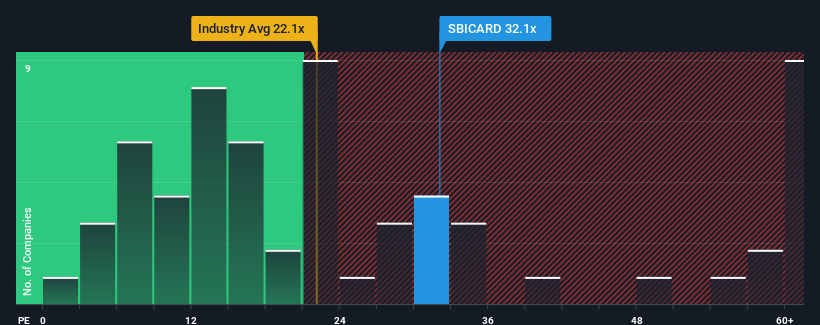- India
- /
- Consumer Finance
- /
- NSEI:SBICARD
SBI Cards and Payment Services Limited's (NSE:SBICARD) Price In Tune With Earnings

SBI Cards and Payment Services Limited's (NSE:SBICARD) price-to-earnings (or "P/E") ratio of 32.1x might make it look like a sell right now compared to the market in India, where around half of the companies have P/E ratios below 29x and even P/E's below 16x are quite common. However, the P/E might be high for a reason and it requires further investigation to determine if it's justified.
SBI Cards and Payment Services could be doing better as it's been growing earnings less than most other companies lately. One possibility is that the P/E is high because investors think this lacklustre earnings performance will improve markedly. You'd really hope so, otherwise you're paying a pretty hefty price for no particular reason.
Check out our latest analysis for SBI Cards and Payment Services

Is There Enough Growth For SBI Cards and Payment Services?
SBI Cards and Payment Services' P/E ratio would be typical for a company that's expected to deliver solid growth, and importantly, perform better than the market.
If we review the last year of earnings growth, the company posted a worthy increase of 8.4%. Pleasingly, EPS has also lifted 103% in aggregate from three years ago, partly thanks to the last 12 months of growth. Therefore, it's fair to say the earnings growth recently has been superb for the company.
Turning to the outlook, the next three years should generate growth of 24% per annum as estimated by the analysts watching the company. Meanwhile, the rest of the market is forecast to only expand by 19% per annum, which is noticeably less attractive.
In light of this, it's understandable that SBI Cards and Payment Services' P/E sits above the majority of other companies. It seems most investors are expecting this strong future growth and are willing to pay more for the stock.
The Bottom Line On SBI Cards and Payment Services' P/E
Generally, our preference is to limit the use of the price-to-earnings ratio to establishing what the market thinks about the overall health of a company.
We've established that SBI Cards and Payment Services maintains its high P/E on the strength of its forecast growth being higher than the wider market, as expected. Right now shareholders are comfortable with the P/E as they are quite confident future earnings aren't under threat. Unless these conditions change, they will continue to provide strong support to the share price.
It is also worth noting that we have found 2 warning signs for SBI Cards and Payment Services (1 shouldn't be ignored!) that you need to take into consideration.
If these risks are making you reconsider your opinion on SBI Cards and Payment Services, explore our interactive list of high quality stocks to get an idea of what else is out there.
New: Manage All Your Stock Portfolios in One Place
We've created the ultimate portfolio companion for stock investors, and it's free.
• Connect an unlimited number of Portfolios and see your total in one currency
• Be alerted to new Warning Signs or Risks via email or mobile
• Track the Fair Value of your stocks
Have feedback on this article? Concerned about the content? Get in touch with us directly. Alternatively, email editorial-team (at) simplywallst.com.
This article by Simply Wall St is general in nature. We provide commentary based on historical data and analyst forecasts only using an unbiased methodology and our articles are not intended to be financial advice. It does not constitute a recommendation to buy or sell any stock, and does not take account of your objectives, or your financial situation. We aim to bring you long-term focused analysis driven by fundamental data. Note that our analysis may not factor in the latest price-sensitive company announcements or qualitative material. Simply Wall St has no position in any stocks mentioned.
About NSEI:SBICARD
SBI Cards and Payment Services
A non-banking financial company, issues credit cards to individual and corporate customers in India.
Exceptional growth potential with mediocre balance sheet.


